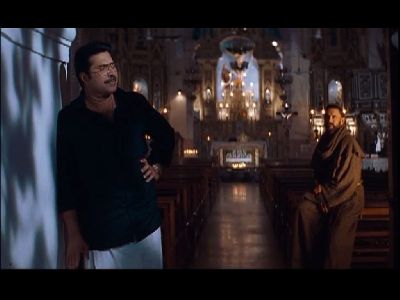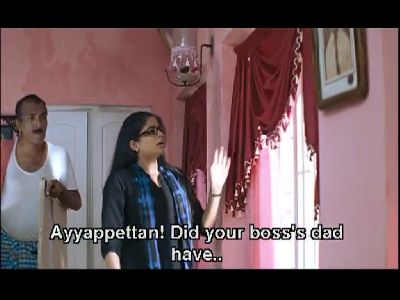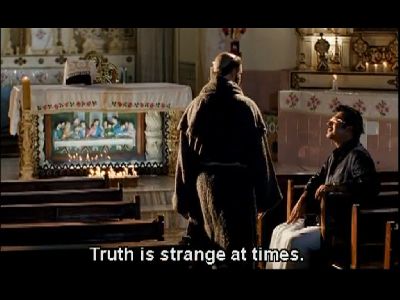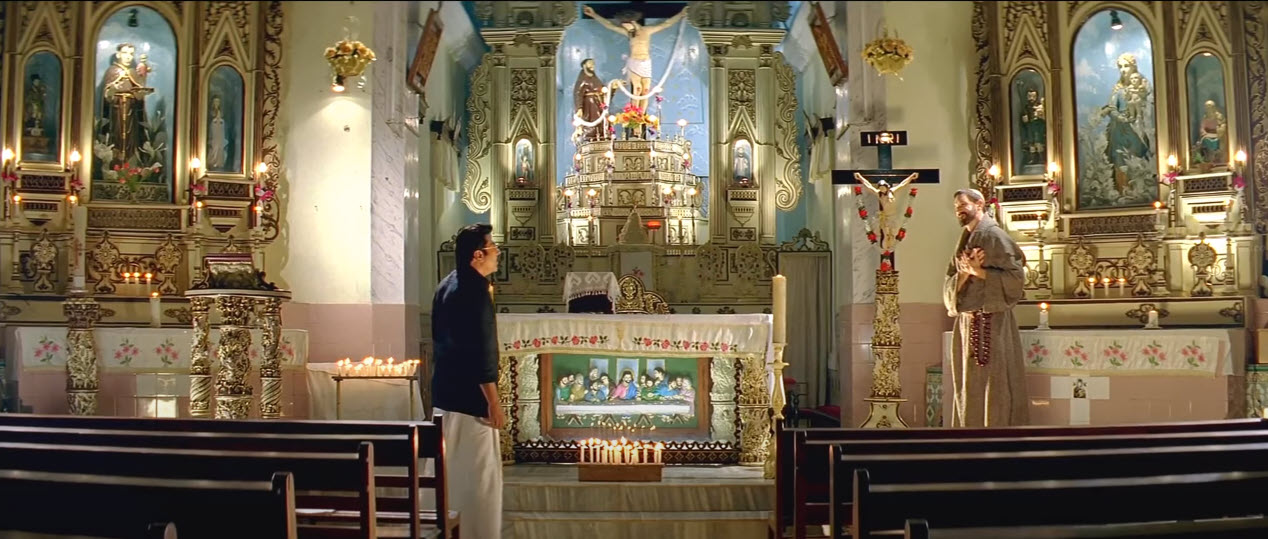Last updated on December 29, 2022
This post first appeared on Totally Filmi on November 11, 2011.
Late one evening, businessman Chirammal Enashu Francis (AKA Pranchiyettan, as per the film’s title) makes a visit to the churchyard, first, to “visit” with his ancestors (whom he claims later to be able to actually see). Pranchiyettan needs their blessings for something – and we learn what that something is when, suddenly, Saint Francis of Assisi appears before Pranchiyettan, who proceeds to tell the saint a story.

It’s hard not to compare Pranchiyettan and the Saint to another Ranjith film, house favorite Nandanam – both feature main characters who have intense, personal relationships with religious figures – the god Krishna, in the case of Nandanam’s Balamani, and, of course, Saint Francis for Pranchi. But whereas Nandanam was about having faith in the gods and what they will provide, Pranchiyettan and the Saint is more about finding the confidence to have faith in oneself.
In some ways, Ranjith’s film starts out as a magnificent skewering of Pranchi and what he represents. Pranchiyettan is a successful businessman – and although his ancestors were rice traders, he’s managed to take the family fortune and expand it into other areas, including gold jewellery and real estate. He’s never managed to shake off the nickname everyone calls him by, though: “Ari Pranchi” – “rice Pranchi”. And it’s a nickname that grates. For Pranchiyettan, it symbolizes everything he feels uncomfortable with in his life – his humble background, his lack of education – everything. Pranchi is determined to lose the hated nickname, and to do it? He decides to buy his way to honours, fame, and respectability. Most particularly, he sets his sights on the Padma Shri, the award given for contribution to the state in various fields of endeavour. When his attempts to prove he’s worthy of it for his good works seem to falter, he’s not above placing a little money in the right places to grease the wheels of the process. “If I want to drink a tender coconut, I can pay 10 rupees for it,” he notes as justification. “Why bother to clmb the tree and cut it down myself?”
It would be very easy for us to see Pranchi as a kind of pathetic figure. But the strength of Ranjith’s script , and of Mammootty’s performance, is that it allows us to peel back the layers of the man, to see what led to him being who he is, to see the circumstances that led to the lack of confidence that causes him to, say, lose the presidency of the local club (he totally misreads the membership – they want someone like themselves; he swaps traditional clothing for Western dress. And because he feels so inadequate next to the only other candidate for the position, his long-time rival Jose (Siddique), he flubs his well-rehearsed speech). Pranchi seems overdue for a lesson in learning to be himself, and to act in the interest of others without worrying how he’s going to look or what he’s going to get out of it.
Enter Padmasree (a delightful but woefully underutilized Priyamani). She needs someone to inaugurate the art show she’s organized, and Omana (Jose’s wife, who recognises Pranchi’s worth even if he doesn’t) suggests Pranchi. Padma and Pranchi become friends, and Padma, who arrives with a painting to thank Pranchi for helping her, starts by renovating a room to suit it, and ends up giving Pranchi’s house and his life a complete makeover. The relationship between Pranchi and Padma is a lovely one, as a friendship develops between the two, and Pranchi is able to use his skills as a businessman who understands a bit about real estate to help her save her family home. So, it’s kind of a disappointment when she almost completely disappears in the latter portion of the film.


As good as Pranchiyettan and the Saint is, though, I did in the end feel a slight sense of disappointment. The second half of the film, for me, seems a much messier affair than the first half, which fairly sparkles with wit and charm. The disappearance of Padmasree and the arrival of Paulie (Master Ganapathy), the young man who truly needs the help Pranchi can offer him, send the film in a direction that, for me, anway, derailed it slightly. I totally understand that Paulie’s story stands in contrast to that of Pranchi’s own – that if we learn not to accept Pranchi at face value and learn to understand him, that we – and Pranchi, of course – must do the same for Paulie. But I don’t think the connection is as deftly realized as it could have been. In addition, I felt the young actor’s performance to be a bit over-the-top and given to histrionics and excess at times – I kept wishing the director had reigned in his young actor just a little bit instead of letting him indulge in dramatics. I think I would have felt much more sympathy for Paulie if he had.
Finally, I did find the ending just a wee bit less than satisfactory. After Pranchi finishes telling his story, Saint Francis tells him that he needs to know that sometimes things are not always at they seem. Of course, Paulie’s story has given Pranchi an excellent example of that, but Saint Francis reveals a number visions to Pranchi, showing him ways in which he has misunderstood things. First, how Padma really feels about him; second, the true nature of the relationship of Omana and Jose (a relationship Pranchi had envied since the time that Jose stole Omana away from him when they were still at school).

Small disappointments aside, though, Pranchiyettan and the Saint offers some truly stellar moments. I adored the relationship between Pranchi and his servant Eeyyappan (Sasi Kalinga)– in fact, Eeyyappan is a terrific character, helping Padma redo Pranchi’s house, and offering a counterpoint to the comings and goings of Pranchi and his friends.
The childhood rivalry that continues into adult life is well done, with Omana (Khushboo) acting as friend and confidente to her husband’s rival. Jose continues to provoke Pranchi, always finding just the right thing to throw Pranchi off – usually a joke involving a milkmaid. The three move in the same social circles, even if Pranchi constantly feels inadequate compared to the two well-educated doctors, and it’s obvious that there’s a relationship underneath the rivalry.
There is a contrast between the Pranchi’s attempt to buy the Padma Sri in order to make himself more important and respectable, and the selfless acts he later undertakes in the film, showing us that underneath it all, he truly is a good man, only one pushed to morally questionable acts by his own lack of confidence. But his skills as a businessman mean he can help Padma in her attempt to buy her ancestral home, and his devotion to his friend the schoolmaster leads him to help Paulie succeed at his exams.

“La vita è un grande sogno, mio figlio,” says the Saint (who speaks in unsubtitled Italian until he switches over to the Thrissur dialect spoken by Pranchi). “Life is a great dream, my son, and you should never doubt. Doubts are for unbelievers.” Pranchi learns, ultimately, to allay his doubts about himself, and to trust in himself to be able to do the right thing, for the right reasons.

